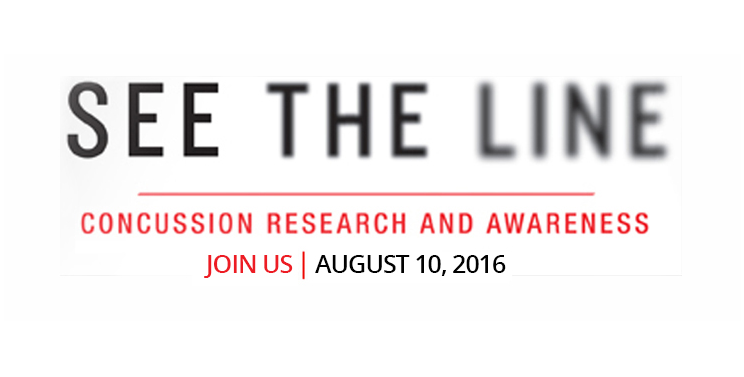Concussion research, education, and awareness took centre stage Wednesday at Western’s Natural Sciences Centre as the University’s annual “See The Line” conference returned for a fourth year.

The day-long event, hosted by Western’s Schulich School of Medicine and Dentistry, began at 8 a.m. with a series of morning lectures and workshops, and finished off in the afternoon with a four-hour-long community information symposium.
Welcoming remarks from retired NHL’er, Hockey Hall of Fame inductee, and See The Line Honorary Chair Eric Lindros kicked-off the symposium portion before a sold-out crowd of 700 people.
Lindros was followed by a keynote speech from Dr. Douglas Smith, and talks from experts including Dr. Doug Fraser, Western MSc Candidate in Medical Biophysics Kathryn Manning, and surgeon Dr. David Mulder.
The symposium concluded with an hour-long panel discussion on concussions, moderated by Schulich’s Dean Dr. Michael Strong, which featured Lindros, retired CFL offensive lineman Greg Wojt, Canadian pole vaulter Robin Bone, former Mustang running back Tyler Varga, and local basketball player Allie Fischer.
Also taking part in the panel were Gordon and Kathleen Stringer, parents of the late Ottawa teen Rowan Stringer, who passed away on May 12, 2013 of “second impact syndrome” after suffering three concussions in less than a week while playing high school rugby.
Speaking to AM980’s Devon Peacock Wednesday morning, Gordon and Kathleen said talking about Rowan’s story is difficult but necessary.
- ‘Deeply ashamed’: Canadian Medical Association apologizes for harms to Indigenous peoples
- Kate Middleton marks quiet return to work following cancer treatment
- Health Canada gives 1 year to remove BVO from drinks. What are the risks?
- Never heard of eastern equine encephalitis? Cases are ‘likely underreported’
“It’s difficult in some ways because it’s like reliving it, and in other ways it’s a healing thing to do, and it’s an educational thing to do,” said Kathleen. “We know that the general public learns best by actual stories, sometimes better than they learn by just facts and science, so it’s worth us telling the story.”

Get weekly health news
At a June 2015 coroner’s inquest into her death, it was learned that Rowan had texted a friend in the days leading up to her last match on May 8, 2013 that she was tired and had a headache but would play the upcoming game anyway, according to a CBC News report.
Rowan, the team’s captain, apparently ignored any concerns about a possible head injury, and told her friend that she would continue with playing the match because “nothing would stop me unless I’m dead,” the report said.
During the match, Stringer was involved in a hard tackle and was rendered unconscious. She was rushed to hospital and was placed on life support as doctors tried to lower swelling in her head. She passed away days later after being taken off of life support.
Asked what they hoped people would take away from Rowan’s story, Gordon said it was key for them to get the message out that those who suffer a concussion or head injury “need to have the right treatment at the right time by the right medical professional.”
“Remove them from play, and just have it checked out. Most cases are going to fully recover. It may take a week, it may take 10 days, but in most cases you’re going to be fine,” Gordon said. “Your brain does need that time to heal, and it’s very important that you disclose and that parents support the athlete in getting the treatment that they need to get.”
The 17-year-old’s death prompted the introduction of a private member’s bill at Queen’s Park by Ottawa-area PC MPP Lisa MacLeod, who also spoke at Wednesday’s symposium.
Rowan’s Law, which passed through the Ontario Legislature in early June and saw public support from MacLeod’s fellow symposium speaker Eric Lindros, was introduced to improve concussion protocols in Ontario youth sports.
The legislation is the first of its kind in Canada, and applies only to Ontario. With the legislation, student athletes would be removed from play if they were suspected of suffering a concussion. They would not be allowed back in the game until they received medical clearance.
The legislation will also see the implementation of recommendations made during the Coroner’s inquest into Stringer’s death.
In a statement, MacLeod said one of the first people she reached out to when she decided to take on Rowan’s Law was Schulich’s Dean Dr. Michael Strong.
“It’s natural that this year at See the Line we celebrate the passage of Rowan’s Law because right from the beginning it was this University in London, Ontario that stepped up to the plate,” she said.
Gordon says they hope the passage of Rowan’s Law will be a catalyst for a cultural change in sport when it comes to concussions and head injuries.
“Where the idea of taking one for the team, or playing through the pain, or playing through the dizziness or whatever you’re suffering is not what’s paramount. You need to look after your brain and look after yourself, and you can still have an active and healthy lifestyle, but you need to look after yourself in order to do that,” he said.












Comments